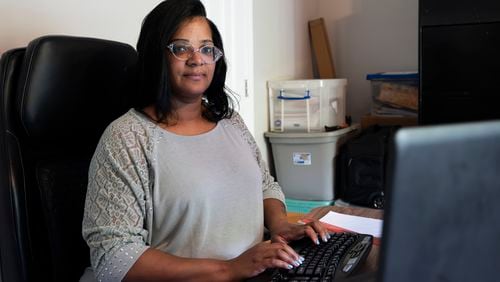Tiesha Foreman could not believe the email sitting in front of her. She burst into tears.
Sitting in her home office, the Douglasville accountant gazed at a refund notice for canceling her family’s health insurance plan on the Affordable Care Act marketplace. Except she had not canceled it. Some agent somewhere had switched her family’s insurance plan yet again without her knowledge — the plan that she and her insurance agent carefully chose to meet her family’s health care and budget needs.
Foreman and her attorneys say what happened to her and her family was part of a wide-ranging health insurance scam affecting people around the nation covered by ACA plans. The non-profit KFF Health News has reported recently on an increasing number of people affected by unauthorized plan switches, saying that Florida, Georgia and Texas are plan-switching hotbeds.
A half-dozen times over the course of 2023 and this year, someone switched one or more members of the Foreman family’s health insurance without their consent or knowledge, she told The Atlanta Journal-Constitution this week. It all started after her husband responded to a misleading ad that offered a cash card. What the ad and the call center he contacted didn’t explain was that her husband would be signed up for a new health insurance policy that required a big federal subsidy to make it free. When all the dust cleared, the subsidy was improperly applied to Mr. Foreman’s new insurance account — and the IRS wanted it back.
The fallout has cost the Foreman family thousands of dollars in uncovered medical bills and robbed them of medical care. Her husband had a surgery, but then found out he was uninsured for follow-up appointments, she said. Paying back the federal subsidy that they didn’t actually qualify for will cost the family more than $4,000 alone, she said.
According to a lawsuit filed by people who say their plans were illegally created or switched, companies, working through call centers in Florida present themselves as legitimate while actually disenrolling ACA policyholders on a mass scale. The centers sign people up for a new insurance plan in order to collect the monthly insurance commissions.
That prize? About $30.
But done quickly enough, to enough people, month after month it adds up, said Jason Doss, Foreman’s lawyer. A key tool is the computer software that allows agents to go into the federal ACA exchange computer system and change the person’s insurance. All the agent has to know is the consumer’s name, date of birth, and state of residence.
The initial plan signups or switches, Doss argues, come may come from deceptive ads that lure people with the offer of a cash card to help with household expenses. He says they concentrate on poor people because they can qualify for free plans, and if their premium is zero they’ll never be tipped off by a refund when the plan is canceled.
Doss has filed a federal class-action RICO lawsuit for Foreman, other insurance clients, and insurance agents who lost commissions for plans they had carefully crafted for clients.
Callie Navrides, an agent in Augusta, is one of them. She says she likes to spend time explaining insurance plan options to her clients, and to be honest with them. She was mystified when she noticed her clients suddenly switching plans in the last couple years. Now she knows it was done behind their backs.
She can go through the work of calling the client and then the federal agency that runs the Marketplace signup website to switch them back, but it takes multiple calls per client. And then after fixing it, they can be switched back again within hours, she said. She estimates she’s made more than 100 phone calls like that this enrollment season alone.
She can’t compete with the misleading ads and false promises, so she’s going to shift her business, she says. “It’s just not feasible,” she said. “It’s not profitable to run our business this way.”
Some of the four companies accused in the lawsuit said they would not comment, or blamed rogue employees for the problems.
Enhance Health, based in Sunrise, Fla., said it was dedicated to “transforming” the complicated healthcare enrollment process for people and it wanted to improve access for them.
“We take any allegations of misconduct by our employees or partners seriously and are committed to upholding the highest standards of compliance and controls in all aspects of our operations.” Enhance Health said the lawsuit was without merit and baseless.
Enhance Health was funded by a $150 million investment from Bain Capital Insurance, which is not a defendant in the suit. A spokeswoman for Bain said the company would not comment on the ongoing litigation.
Foreman hopes the suit changes something.
“How do you feel good about doing this to people?” Foreman said, of whoever switched her account. “When you’re ruining somebody else’s life? Because that’s really what this kind of has done in many ways.”
About the Author







